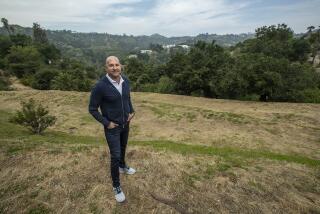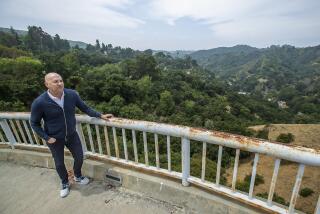Last Resort? : Developer Fears Lenders Will Desert Monarch Beach Project
- Share via
DANA POINT — A Tokyo-based developer’s decision last week to scale back its $500-million resort and luxury housing project in Monarch Beach was in part a response to pressure from its Japanese lenders to quiet local opposition.
The Japanese banking consortium that developer Nippon Shinpan Co. Ltd. hopes will finance the project recently warned that it might back out if the plan is opposed by local residents concerned with the fate of one of Southern California’s last undeveloped seaside properties.
Such opposition, the Japanese banks feared, might generate bad publicity that they would rather avoid.
And with $150 million already invested, Nippon Shinpan--Japan’s leading credit card company--evidently didn’t want to take any chances that its first major resort development in the continental United States would fall through.
But even the scaled-down plans haven’t quieted the developer’s fears.
“If it takes a long time to get a permit for our modified proposal, the Japanese banks may walk away from financing our project,” said Masao (Mike) Sato, chief executive of Monarch Bay Resort, the unit of Nippon Shinpan that is developing the property.
The 232-acre project has not yet generated significant opposition, but city officials have voiced concern that the coastal property includes environmentally sensitive plant life that provides habitat for a protected species of bird, the California gnatcatcher.
The Japanese banking group, which Nippon Shinpan official won’t identify, is skittish not only about possible negative publicity, but also because of the tight credit situation in Japan.
Although there are signs that Japanese lenders may loosen credit restraints later this year, said Newport Beach attorney Lisa Kitsuta, the scaling back of Monarch Beach plans is just part of a wave of realism that has hit Japanese developers in recent years.
According to a study that appeared this week in a Japanese business publication, Nikkei Weekly, nine of 10 planned resorts in Japan have been scaled down, delayed or canceled in the last four years because of high interest rates or asking prices by property owners.
“Japanese banks are walking away from funding this type of hotel-resort project because many have been burned recently by bad real estate loans and they’re reluctant to lend money for this sort of development,” Sato said.
If Nippon Shinpan can’t get financing for Monarch Bay Resorts from the banks, “this project will be killed, and to revive it will be very difficult,” he said.
Sato’s company hopes to obtain all the necessary approvals from the city, county and state Coastal Commission for the project in the next few months and to start construction work in the spring.
But getting the City Council to approve the project so soon could be tough. It took a previous owner, Hemmeter/Laguna Niguel Resorts Assn., several years of negotiating before it won permission to develop the property in 1988.
Although response to the scaled-back project has generally been positive, the city’s five council members say they will not be badgered into making an early decision. They want to thoroughly assess the project’s environmental and economic impact, they said.
“There are new federal and state laws being proposed concerning environmental issues that could jeopardize their plans to break ground next spring,” Councilman Mike Eggers said.
In addition to concerns about endangered flora and fauna on parts of the property, there also are questions about how the project will be phased in and how to limit traffic congestion in the area, Eggers said.
He said city officials also want affordable housing provided for employees of the hotel and golf course.
Another concern is the lack of commercial retail space in the project, said Stephen J. Duffy, a managing director at the Kenneth Leventhal & Co. accounting and consulting firm in Newport Beach. Without more retail business, the project may not bring many tax dollars to the city, he said.
But this doesn’t seem to bother local residents.
Thomas C. Crump, president of Monarch Beach Civic Assn., said his group found the latest proposal acceptable.
The proposed project includes a single 400-room, five-star hotel; 238 single-unit luxury homes; a 13-acre extension of the 18-hole Links of Monarch Beach golf course; and a 21.5-acre park with botanical gardens, a pavilion, an outdoor amphitheater and public viewing areas.
Under the original plan, Nippon Shinpan would have built more than 1,100 hotel rooms, including 850 rooms in a single hotel modeled after Hearst Castle in San Simeon; a 276-suite hotel, 70 townhouses, a park and a recreation and conference center.
More to Read
Inside the business of entertainment
The Wide Shot brings you news, analysis and insights on everything from streaming wars to production — and what it all means for the future.
You may occasionally receive promotional content from the Los Angeles Times.










